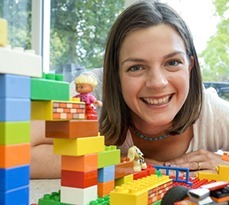Dr Gina Gomez de la Cuesta is passionate about LEGO-based therapy and how this can help autistic children to improve social communication skills. We talked to Gina about her work and how an idea for a few training courses for professionals working in the field of autism turned into a social business.
Gina says it’s all started with her PhD studies at the Autism Research Centre at the University of Cambridge, where she was working with Professor Simon Baron-Cohen and Dr Ayla Humphrey evaluating the effectiveness of LEGO-based therapy for children with autism.

Gina learned about the approach from its pioneer, child neuropsychologist Dr Dan LeGoff, and travelled to Philadelphia to meet him in 2004. “I then came back to Cambridge to run the first-ever UK LEGO-based therapy groups.” Since publishing her PhD research in 2008 and co-authoring the LEGO-based therapy manual in 2014, there has been lots of interest from professionals and families in how to run the intervention, so in 2015 she set up Bricks for Autism in Cambridge.
Gina says the idea of this therapy is to promote collaboration and interaction with other children while building a LEGO model. Children are split in roles – including an engineer who has the instructions, a supplier who has the bricks, and the builder who puts the model together. Children then take turns to play these different roles and immediately have a joint focus on the same thing. If there are any problems an adult supervisor can help to solve them. Gina thinks the therapy is suitable for pretty much any age (maybe except toddlers as they might be too young), as the activity can be adapted according to the needs and interests of the group.
“This therapy is slightly different to other approaches to teaching social skills, because children learn in the moment, whilst they are having fun building LEGO together. It is enjoyable, flexible and low anxiety for the children,” Gina says. “The key intervention is splitting the LEGO building into different roles, so that children have to work together to successfully build the LEGO model.”
Why LEGO? Because it’s very familiar to children and everyone loves it, Gina explains: “LEGO is a lot of fun and can offer many positive things – children can achieve something, because they are good at LEGO building, and that is good motivation to learn and interact with others.”
Bricks for Autism currently offers one-day introductory training courses for professionals who want to run LEGO-based therapy groups with children who have social communication difficulties. With a small team of two, Gina is looking to expand in the future as the demand is high – she says people travel from all over the UK and abroad to attend the courses.
Gina says she would like to develop additional online training courses in the future, as well as information for parents and step-by-step video guides for people to learn about the intervention more easily. “In the near future we’re planning to offer a training for trainers course, where people can learn how to train others in the intervention to spread the word more widely and effectively.”
The biggest challenge at the moment is lack of time and resources, as Gina is also working part-time as a clinical psychologist and is a mother of two children.
Nevertheless, Gina is proud that she’s got involved with a large-scale randomised controlled trial into effectiveness of LEGO-based therapy with York and Sheffield universities.
“But above all, I am really proud of how many children and young people may be benefitting from this fun social skills approach through the number of people I have trained. I hope to improve the lives of those affected by autism and other social communication difficulties by increasing the access to stress-free social opportunities for children.”
Professor Simon Baron-Cohen, Director of Autism Research Centre said: “I’m delighted that Gina’s innovative doctoral research has been translated into schools and clinics via Bricks for Autism, which donates a share of profits to the Autism Research Trust. This is helping autistic children and supporting vital research.”
With her background in academia, Gina didn’t have any training or knowledge about business. So in March 2018 she joined the Cambridge Social Ventures programme run by the Cambridge Centre for Social Innovation at the School. Gina says the training, mentoring and practical advice will help her progress further with the venture.
Karen Leigh Anderson, Business Advisor at Cambridge Social Ventures, commented: “Bricks for Autism is building on extensive, international research and practice to use LEGO to help individuals with communications and learning disabilities. Gina and her team are finding many professionals in teaching and social work are interested in learning to use their approach in their work. Their biggest challenge is meeting the demand for training and ensuring high quality in delivery.”
This article is part of Venturing Forth, our new series on the aspirations and challenges of ventures connected to students, alumni and others associated with Cambridge Judge Business School.
*Photo credit: Keith Heppell


